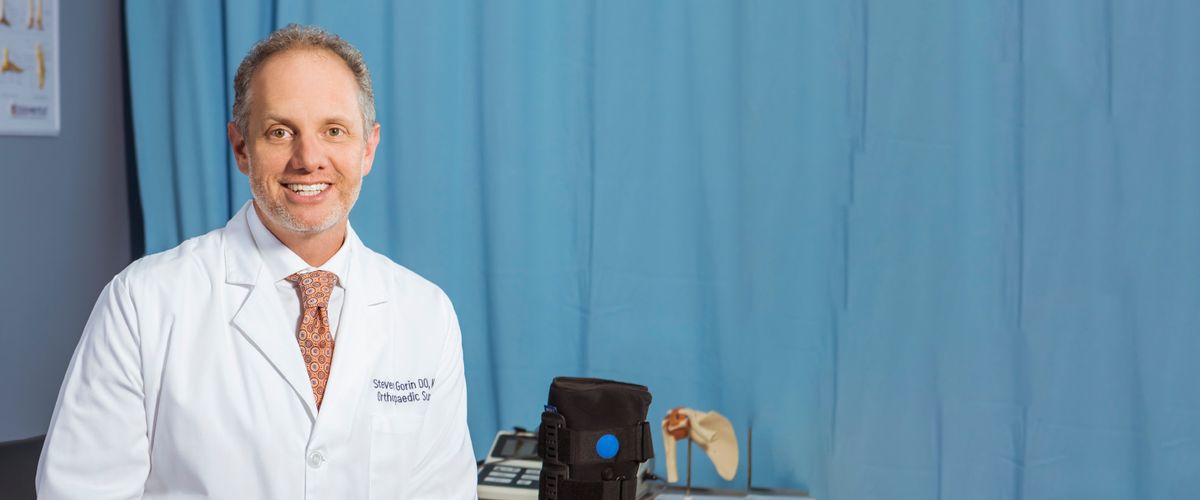Shortly after he found out he was accepted to BU, Steven Gorin flew to Boston with his father to take a campus tour. It was a cold, gray, and rainy early spring day—a far cry from the usually warm, sunny weather the South Florida native was used to. Even so, Gorin says he felt at home as he walked down Comm Ave. “For whatever reason, I just fell in love. The campus, the tour—it seemed right,” says Gorin (’94). At the end of the tour, he proclaimed to his father that he would be attending BU.
That decision set him on a path to becoming one of the top-ranked orthopedic surgeons in Miami.
While Gorin entered BU wanting to follow in the footsteps of his cardiologist father, he also had a passion for history and archaeology. He opted to major in archaeology while taking all of the prerequisites to attend medical school, but after one semester, he felt a little aimless, unsure if it was the best choice for him. One day, he was sitting in his first-year chemistry class when one of his friends suggested he look into Sargent. It sounded like the right fit, and he made the switch. “One draw of Sargent, for me, was that it was very streamlined. I knew exactly what classes I needed to take each year. I also thought it would better help me get into medical school.”
Gorin transferred into Sargent’s bachelor’s in human physiology program, which has all medical school prerequisites built into its curriculum. Classes in gross human anatomy and exercise physiology planted the seeds for his interest in helping people recover from sports-related injuries. Gorin says he still draws from his Sargent education today, including Professor Emeritus Whitney R. Powers’ anatomy lessons, which, he says, are “the backbone of my knowledge and understanding of the human body and its function.”
Helping People Live Pain-Free
Gorin returned to Florida to get his master’s degree in sports medicine from the University of Miami before starting medical school at Nova Southeastern University in Davie, Fla. He still intended to become a cardiologist just like his father—until he finished his orthopedics rotation in his fourth year. “I went to my dad and said, ‘I’m lost.’ I loved my cardiology rotation, and I thought this was what I wanted to do my whole life. I grew up with it,” Gorin says. “But I really loved my ortho rotation and being in the operating room. The idea that I could directly fix someone’s pathology or injury was very appealing.” His father encouraged him to do what would make him the happiest.
“Through a team effort, we have been able to get [patients] back to their sport and oftentimes avoid surgery unless it is completely necessary.”
After his residency, Gorin completed a fellowship in orthopedic sports medicine, which gave him the opportunity to work as the physician for the various athletic teams at Rowan University in New Jersey. The fellowship also allowed Gorin, who played on the club volleyball team at BU, to be one of the physicians for the Association of Volleyball Professionals, the largest professional beach volleyball league in the US, as well as for the Jose Cuervo Pro Beach Volleyball Series. He also spent a few years in a postfellowship working with US Youth Soccer, treating young athletes who were training in Florida.
Today, Gorin is an orthopedic surgeon at the Advanced Orthopedic & Sports Medicine Institute, a practice he cofounded in Aventura, Fla. Ranked highly by U.S. News & World Report, the institute sees patients from “age 2 to age 102” for all kinds of injuries, “from hand to foot.” He primarily treats sports-related injuries. The most common are those affecting the knees, shoulders, and ankles—such as meniscus tears, rotator cuff tears, and ankle sprains. He also does joint replacements.
As Gorin grew his practice over the years, he realized he still had a lot to learn about the business side of medicine. “When you go to medical school, you learn medicine, but you don’t really learn anything about the business of medicine,” he says. In 2018, he received an MBA from the University of Miami.
A lot has changed in the field of orthopedics, Gorin says. For one, since he began his practice, he says the use of biologic agents—substances from a patient’s tissues or from donors—over steroids to decrease inflammation has become a more commonplace practice. He also notes that “the understanding of the mechanics around the entire shoulder joint, including the scapula, has grown by leaps and bounds.”
Gorin says his work continues to inspire him every day. “I have seen people who play basketball, baseball, soccer, football, and dance—to name a few—who have come to the institute concerned about their specific injury. Through a team effort, we have been able to get them back to their sport and oftentimes have been able to avoid surgery unless it is completely necessary. The beauty of orthopedics is we’re able to help people get out of pain and get back to their normal daily lives,” he says. “With surgery, we can directly affect somebody’s life. When I go in and fix something, I know I’ve fixed it. And even if it’s something not operative, it’s gratifying to help people get out of pain or discomfort and be active again. I know it’s so important.”
